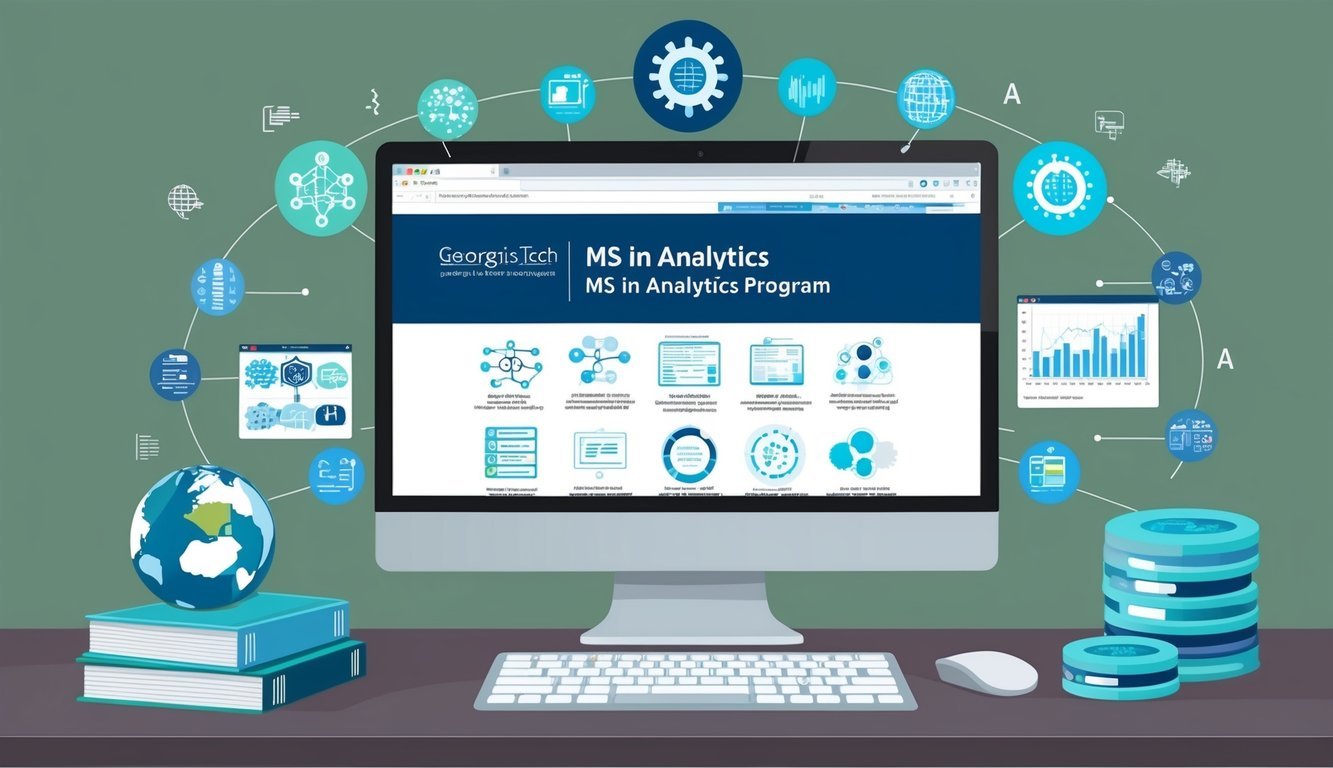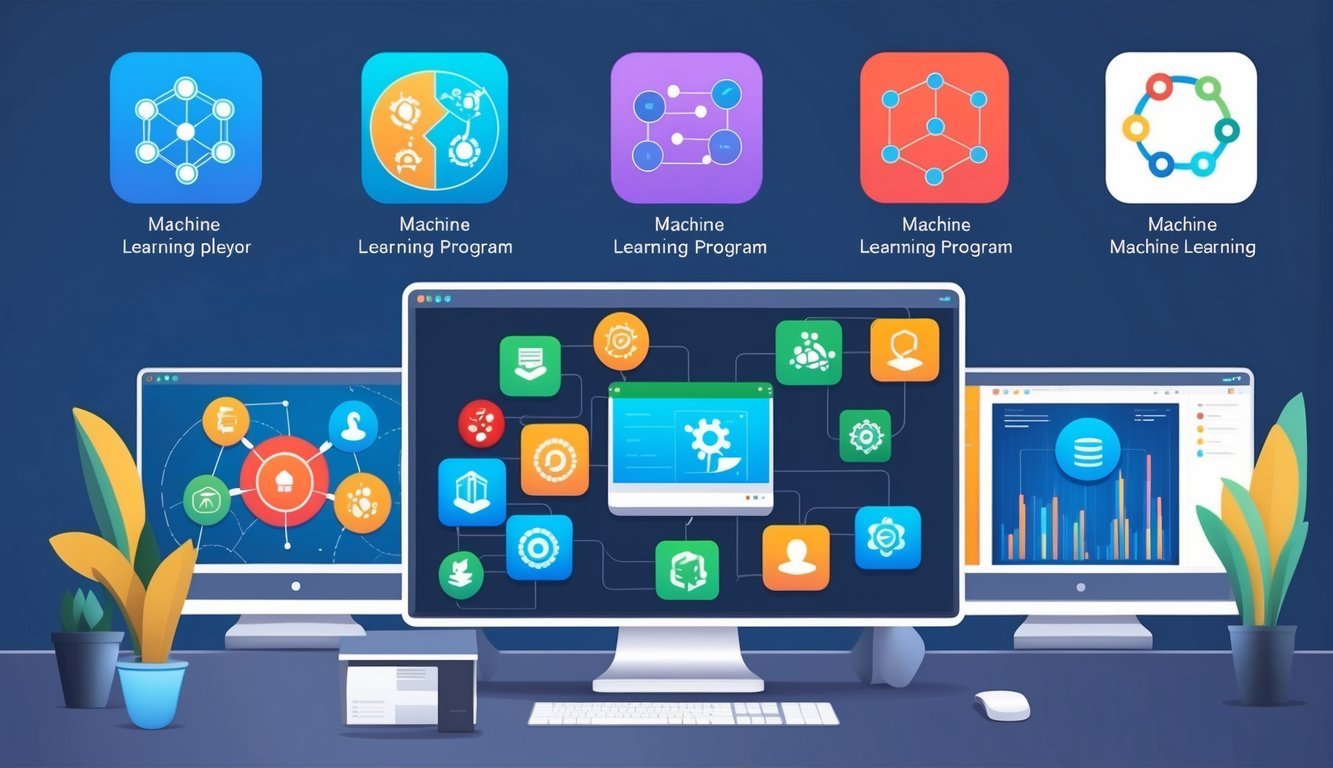Machine learning isn’t just a buzzword; it’s reshaping our world! Just think about self-driving cars, smart gadgets, and robots learning on their own.
If you’re curious about diving into this thrilling field, you’re not alone.
alt=”Seven machine learning logos arranged in a row”>
Getting into machine learning can really broaden your job prospects.
By taking machine learning courses, you can pick up skills that many companies are itching to find.
You’ll learn how computers can analyze data and make decisions on their own.
Plus, you’ll discover some seriously cool tech that’s shaping our tomorrow.
1) Stanford University’s Master of Science in Computer Science

If you’re looking to take your coding skills to the next level, Stanford’s MS in Computer Science might just be your ticket.
This program is ideal for anyone eager to supercharge their tech career.
You’ll get to tackle fresh topics like artificial intelligence and computer vision.
What’s great is that you can tailor your studies to fit your interests—how awesome is that?
Dreaming of creating the next tech marvel? You can branch into hot areas like human-computer interaction or data science, both of which are in high demand right now.
The cherry on top? You’ll learn from folks who are truly shining in the field.
Stanford boasts a faculty composed of leading researchers and industry experts.
Just a heads-up, this is a terminal degree, perfect for preparing you for the industry, not a PhD.
If you’re still figuring out your path, that’s totally fine—you can decide later.
Most students wrap things up in about 1.5 years, needing to complete 45 units of coursework to graduate.
It’s a bit intense, but the skills you’ll walk away with make it all worthwhile.
2) Carnegie Mellon’s Master of Computational Data Science

If you want in on the data science and machine learning action, check out Carnegie Mellon’s Master of Computational Data Science (MCDS) program.
Offered through the Language Technologies Institute, this program is your gateway to mastering both computer science and data analysis.
You’ll dive into courses on machine learning, which is crucial in this field.
Plus, the curriculum features a Computational Data Science Seminar to keep you in the loop with the latest trends.
Did you ever wonder how computers work together? There’s a course on Parallel Computer Architecture and Programming that can help you get a grip on processing large data sets efficiently.
Carnegie Mellon is a big deal in computer science; it even ranks #1 for both PhD and master’s programs in machine learning!
Thinking of applying? The MCDS program takes place in Pittsburgh, PA, and you can find more details about the application process here.
3) Massachusetts Institute of Technology’s Professional Education Program

MIT’s Professional Education Program has some nifty options for those looking to sharpen their machine learning skills.
Check out their Professional Certificate Program in Machine Learning & Artificial Intelligence—it’s a gem.
You’ll be learning from the best in the biz, with classes led by top MIT experts and industry pros.
You’ll dig into the latest AI tech and see how it’s changing the job landscape.
The cool part? You have different course formats to choose from! There are quick 2-5 day classes if you’re short on time or longer, more in-depth programs if you’re ready to go all in.
Covering a range of hot topics from machine learning to biotech and innovation, MIT’s program keeps you on the cutting edge of tech trends.
Plus, you’ll connect with a global community of learners who share your passion for AI.
4) University of California, Berkeley’s Master of Information and Data Science
If you’re interested in a top-notch online option, UC Berkeley offers the Master of Information and Data Science (MIDS).
This part-time degree lets you learn from wherever you are.
You’ll tackle a mix of subjects perfect for addressing real-world data challenges.
The focus is on using the latest tools and methods to derive insights from all kinds of data.
The flexibility of MIDS is a game-changer.
You can keep your job while you study, immediately applying what you’ve learned.
The curriculum emphasizes asking the right questions and adhering to ethical guidelines.
You’ll have professors who work at leading data-driven companies guiding your journey.
Berkeley’s program has a stellar reputation, is highly ranked, and accredited by WASC, ensuring you’re getting a strong education.
Graduating means you’ll join a network of skilled professionals—an invaluable resource for your career in data science.
5) Harvard University’s Data Science Graduate Program

If you’re eyeing a career in data science, look no further than Harvard’s graduate program.
Here, you’ll learn from some of the top minds in computer science and statistics.
The curriculum covers trending topics like machine learning and big data analysis.
Want to tackle huge datasets? You’ll get hands-on experience for that.
Interested in predictive modeling? You’ll also dive into that.
The program is designed to give you a solid grounding in statistical methods and computational techniques, ensuring you can apply these skills to real-life challenges across various sectors.
One of the program’s highlights is its joint leadership between the Computer Science and Statistics departments.
This means you’ll have a well-rounded education from two major fields.
By the time you finish, you’ll have the skills to tackle complex data challenges, from analyzing large datasets to managing and visualizing data effectively using top-tier tools.
So, if you’re eager to become a data science whiz, Harvard’s program could be your perfect match!
6) Georgia Institute of Technology’s Online Master of Science in Analytics

If you’re keen on boosting your data science skills, Georgia Tech’s Online Master of Science in Analytics is a solid choice.
Designed with your busy life in mind, you can set your own pace.
You’ll cover exciting topics like statistics, computing, and business, all taught by some fantastic professors from one of the top tech schools.
The flexibility here is a lifesaver—you can finish the program in one to two years based on how much time you’ve got to commit to your studies.
It’s perfect if you’re juggling a full-time job while wanting to level up your career.
Expect hands-on experience with real-world data problems! The curriculum includes everything from data visualization to machine learning, prepping you to tackle big data challenges like a pro.
And don’t worry about feeling isolated—there are plenty of opportunities to connect with classmates and professors through online forums and group projects.
It’ll feel like being on campus, just from the comfort of your couch!
7) University of Washington’s Master of Science in Data Science
Thinking about kickstarting your career in data science? The Master of Science in Data Science at the University of Washington could be just the opportunity you’re looking for.
This program equips you with the skills needed to turn big data into actionable insights.
It’s perfect for newcomers and seasoned pros eager to enhance their data skills.
You can pick between full-time or part-time study options.
Classes start in the fall and are scheduled for evenings on campus, making it easy to juggle your studies with work or other commitments.
The program has a thorough curriculum covering essentials like data management, machine learning, and statistics—skills that employers are actively seeking.
A standout feature of this program is its emphasis on real-world applications.
You’ll tackle projects that address actual industry problems, and that hands-on experience is invaluable when you’re hitting the job market.
The University of Washington is known for its top-tier tech programs.
By choosing this master’s, you’re aligning yourself with a respected institution that has great connections to the tech industry.
Key Features of Machine Learning Programs

Machine learning programs boast some impressive features that set them apart.
They focus on crucial skills while working alongside real companies to provide you with practical know-how.
Curriculum Focus
Most machine learning programs offer a comprehensive curriculum.
You’ll learn about algorithms that adapt and improve over time, which is essential for making reliable predictions with new data.
You’ll also dive into data analysis techniques that help clarify big datasets, and explore deep learning strategies that shine in tasks like image recognition.
And let’s not forget—you’ll get hands-on experience with popular tools like TensorFlow and scikit-learn, which are a staple for pros in the field.
Industry Collaboration
Many machine learning programs work closely with tech companies, giving you a glimpse into how ML functions in real-world settings.
You might even get the chance to work on actual projects from partner companies—how cool is that? It’s a great way to bulk up your portfolio and make some solid connections.
Internships or co-op placements often come with these programs, allowing you to apply your knowledge in a real job environment.
These experiences might even lead you to your dream job!
Plus, guest speakers from the industry often drop by to share their stories.
You’ll get insights into the latest trends and challenges in the machine learning landscape.
Benefits of Advanced Data Analysis
Advanced data analysis can help businesses make informed choices and tackle tricky problems.
It uses fantastic tech to uncover hidden patterns in data and predict future outcomes.
Real-World Applications
Want to catch bad guys before they strike? Advanced analytics can help! Banks are using it to spot fraud by analyzing odd spending habits, while retailers use it to anticipate your next purchases.
Even doctors are leveraging this tech to catch health issues early.
Imagine a store knowing exactly what you need before you even step in! That’s the magic of advanced analytics.
It helps companies create products you’ll love and market them in a way that catches your attention.
Think of it as a high-tech crystal ball, but way more practical!
Enhanced Decision Making
Ever wish you could see the future? Advanced analytics is pretty close! It guides leaders to make wiser choices by revealing what might happen next.
This means instead of flying blind, they can rely on data to steer decisions.
This enables them to sidestep problems and seize opportunities.
Think of it as having a super smart advisor who’s always in your corner.
With advanced analytics, you’re not just reacting to events—you’re staying ahead of the game!
Frequently Asked Questions

Machine learning programs offer a wealth of options, catering to learners at all stages.
You can find courses from top-notch universities as well as free platforms ready to kick off your journey in this exciting field.
What are some beginner-friendly machine learning courses?
You might want to give Coursera’s Machine Learning course by Andrew Ng a try—it’s a favorite among beginners.
Another fantastic option is Udacity’s Intro to Machine Learning.
Which universities globally are renowned for their artificial intelligence programs?
Some of the top schools you should consider are Stanford, MIT, and Carnegie Mellon in the US.
If you’re in the UK, check out Oxford and Cambridge, and in Switzerland, ETH Zurich is highly regarded for AI research.
Can you recommend any free platforms to learn machine learning?
Google’s Machine Learning Crash Course is a great resource at no cost.
You could also explore Fast.ai, offering free deep learning courses.
How do I choose the best machine learning program for my level of expertise?
Take a look at the course prerequisites and syllabus.
Beginner courses typically start with Python basics, while more advanced programs might dive right into complex algorithms.
What are some of the leading machine learning algorithms to know as a beginner?
Start with linear regression and logistic regression—then progress to decision trees and random forests.
Don’t overlook K-means clustering; it’s essential for unsupervised learning.
Are there top-ranked U.S. universities for studying artificial intelligence?
You bet! Stanford’s AI program is world-renowned. MIT’s AI courses are also top-notch, and don’t forget about Carnegie Mellon’s AI offerings.

